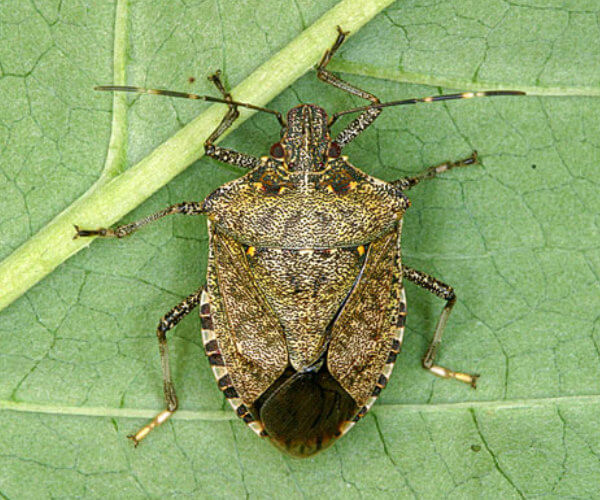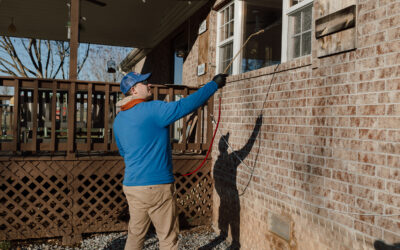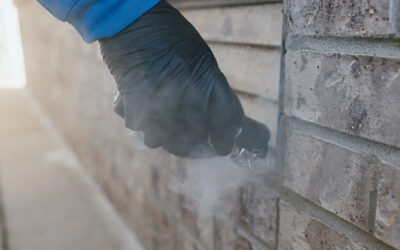
How to Get Rid of Stink Bugs?
Ahhh, fall! The crisp air, the sweater-weather, the pumpkin-flavored everything – the only thing we don’t love about fall is the arrival of stink bugs. This smelly pest spends most of its life outdoors – usually in the fields of farms and other agricultural ventures. But as the weather turns cooler, stink bugs have to find a place to overwinter and avoid buggy frostbite.
While these pests aren’t hazardous to your health or your property, they are a disgusting nuisance come spring. They smell when they’re alive, and they smell even worse when you crush them underfoot – hence the moniker “stink bugs”! And the bad news is that, much like termites and ants, stink bugs travel in groups and breed once they find a safe, warm place to hunker down. And that means if you see one stink bug – it’s pretty likely that there are dozens more in the attic or walls of your home.
So let’s talk about stink bug control! In this case, the best defense is a good offense – meaning it’s a lot easier to prevent stink bugs in the first place than it is to kick them out of your house.
1. Seal the Cracks
Stink bugs can squeeze through much smaller cracks than you would think. So inspect your home top to bottom and fill up any cracks that are ⅛ inch wide or bigger. Pay special attention to areas around utility pipes, the siding of your house, your chimney, and underneath the wood fascia. Use a high-quality silicone or silicone-latex caulk to patch any cracks you find.
2. Check Your Screens
Stink bugs can get in through alarmingly small holes, so check your window and door screens for any rips, holes, or tears. If there are any visible holes, you should repair the screen or replace it if necessary. While you’re there, check for any loose molding, mortar, and weather stripping and replace that as well if needed.
3. Keep the Porch Lights Off
Like many pests, stink bugs are attracted to lights, so keep your outdoor lighting off as much as possible. Once everyone is in for the evening, turn off the outside lights and pull the curtains or blinds to keep from advertising your house as open for business.
4. Reduce Moisture Where Possible
Most pests need water to survive, so they’re drawn to moist places that can help them survive comfortably. Eliminate as much moisture around your home as possible. Check for any leaking pipes or clogged drains. Improve drainage and install gutters or a French drain if your driveway slopes toward the house and gathers water.
5. Starve Them Out
Another way to keep stink bugs away from your house is to remove access to their food supply. Stink bugs eat fruit, vegetables, and other plant matter. Keep your food in airtight containers, throw the garbage out regularly, sweep up crumbs and clean up spills on the countertop as soon as possible. This cuts back on their food supply and limits how attractive your home is for long-term habitation.
6. Check Your Ventilation
Making sure your basement, attic, crawlspace, garage, etc. are all properly ventilated serves multiple purposes. It helps prevent moisture from building up and, when you install screens, you can prevent pests from using the vent system as a pathway into your home. You can also install screens over the chimney.
If you think you may have a stink bug infestation, contact West Termite, Pest & Lawn. We have extensive experience in stink bug pest control in the Arkansas, Oklahoma, and Missouri areas. We’ll send an experienced and professional technician to your home to inspect it for signs of infestation and provide you with a cost- and obligation- free quote!
More posts from West Termite, Pest & Lawn
Pestproofing Entry Points Before Spring
As spring approaches in Arkansas, homeowners face an increased risk of pests seeking warmth, food, and shelter. Many infestations begin with small, unnoticed entry points that allow insects, rodents, and other pests to move indoors. Pestproofing your home before the...
Early Spring Termite Activity in Arkansas
As Arkansas begins to warm in early spring, homeowners may assume termites remain dormant until the summer months. In reality, spring termite colonies can become active much earlier, especially as soil temperatures rise and moisture levels increase. Subterranean and...
Preparing Your Home for Early Spring Pests
As winter fades and temperatures rise in Arkansas, homes become vulnerable to a fresh wave of early spring pests. Early spring is a critical time to take preventive action because insects, rodents, and other pests start emerging from dormancy, seeking food, warmth,...



